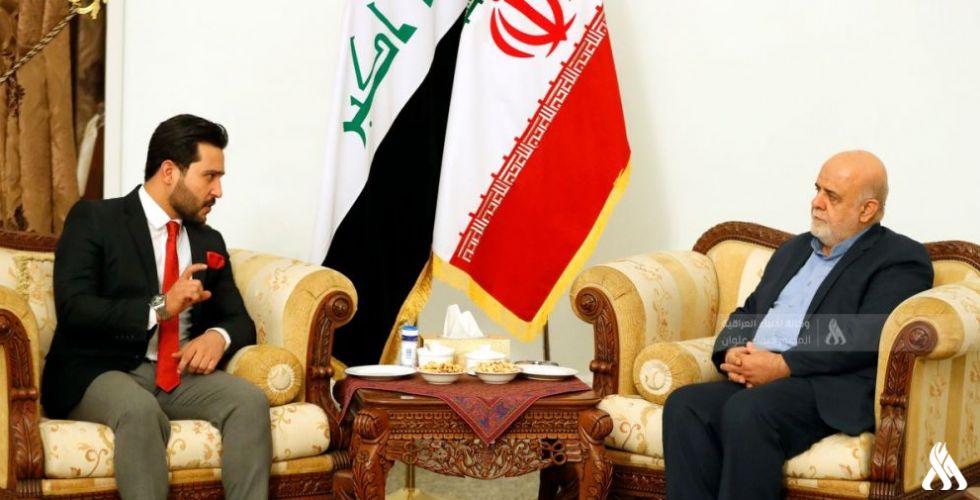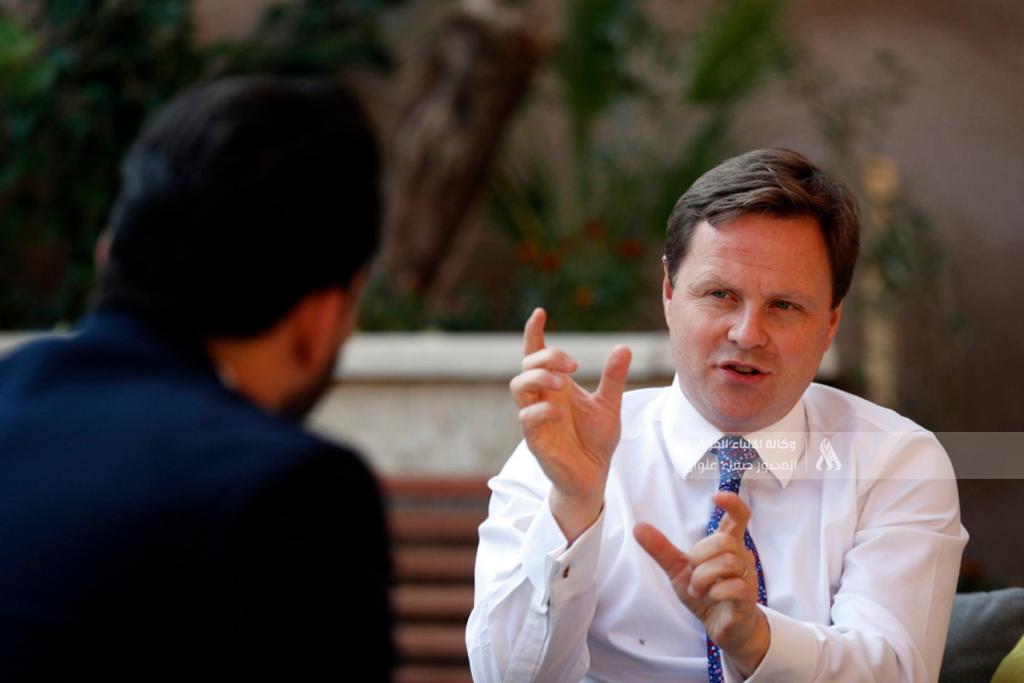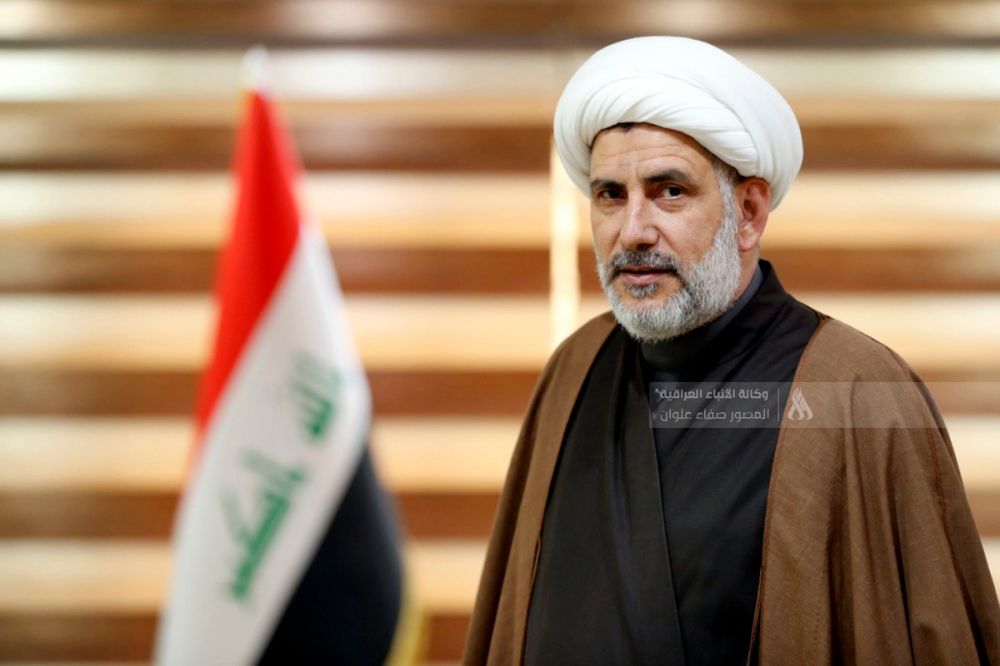
Masjedi: Tehran supports the unity of Iraq and does not have relations with Iraqi factions outside government contexts

- 6-12-2020, 13:32
Baghdad - INA - Harith Al-Abadi
Photo by - Safaa Alwan
The Iranian ambassador to Iraq, Iraj Masjedi, affirmed that his country is supportive of preserving the unity and independence of Iraq and opposes the violation of its sovereignty, while noting that Tehran condemns the targeting of diplomatic headquarters and has no relations with armed factions outside the contexts of the Iraqi government.
Masjedi said in an interview with the Iraqi News Agency (INA), today, Saturday, that "Iran has been and still is supportive of preserving the territorial integrity and independence of the Republic of Iraq and opposes any violation of sovereignty and attacks on its borders by any party," pointing out that "the history of Iranian negotiations The relatively long Iraqi agreement regarding defining land and sea borders is clear, that the two countries have historic agreements, including the 1975 agreement, which is the basis for Tehran's commitment. "
He pointed out that "very good steps have been taken in recent years to solve the pending border issues, and fruitful negotiations have been conducted, which are still continuing," stressing that "the two countries will witness the benefits and positive results of these understandings through subsequent practical measures."
Targeting missions
Masjedi pointed out that "his country expressly declares its opposition and condemnation of the targeting of diplomatic headquarters by any party," indicating that "diplomatic places and missions must be active with complete immunity, and this is an international law that cannot be violated."
He added, "He did not see a great reaction when there were attacks directed by private circles against the general consulates of the Islamic Republic of Iran in the holy cities of Basra, Najaf and Karbala during the past two years, as if they were not diplomatic headquarters, and this is a pity," noting that "his country has repeatedly said that Double standards towards terms such as terrorism are like a wind that reaps its storm growers.”
Fighting terrorism
Masjedi stressed that "Tehran is ready to support Iraq in the fight against terrorism if the Iraqi government requests it," noting that "despite the imposition of sanctions on his country, it was able to meet its defense needs, which is a great achievement."
He explained that "the Islamic Republic of Iran may be considered one of the few countries in the world that is ready to transfer its technology and national knowledge to other countries, including Muslim countries, for their growth and meeting their defense needs," noting that "good steps have been taken in the path of developing defense relations between Iraq." And Iran. "
He added that "the presence of ISIS is a tangible threat, and Iran's support in principle depends on the Iraqi government's request for that," noting that "the Iraqi government requests support in the fields of military advice, training, providing military and defense equipment, or anything else, then his country is ready."
He noted that "the quadripartite center consisting of Iran, Iraq, Syria and Russia is beneficial to the four countries and a source of good security cooperation, and that Iran, as a member of its formation, has provided and provides it with various types of support."
Foreign withdrawal
The Iranian ambassador affirmed that his country hopes for the withdrawal of military forces from Iraq on the basis of the strategic dialogue between Baghdad and Washington, pointing out that Iran's principled position is that the countries of the region must provide their security, and have the capabilities, mechanisms, specializations and human resources necessary to provide security in fighting terrorism, and it does not need the presence of foreign military forces, including American forces. "
Masjedi promised that "the American military presence has negative political and social consequences in the rest of the world, including Iraq," noting that "the Iraqi parliament approved the need for the withdrawal of American military forces from Iraq, and there were millions of demonstrations for the Iraqi people in support of the withdrawal."
He continued, "His country hopes to witness the complete withdrawal of these military forces from Iraq as soon as possible on the basis of strategic dialogue," noting that "the presence of these forces has imposed many problems on the Iraqi people and the region and hopes that the withdrawal of 500 soldiers will not be a symbolic measure."
Armed factions
Masjedi said that Tehran does not have relations with armed factions outside the contexts of the Iraqi government, "adding that" one of the salient characteristics of the Islamic revolution is that it is inspiring, and this characteristic has been present since the beginning of the revolution, and has not decreased with the passage of time. "
Masjedi also indicated that "many groups in various parts of the world want to create relations with the Islamic revolution, but Tehran does not have armed factions outside the Iraqi government contexts."
He pointed out that "Iran, as a neighboring country to Iraq that has official and popular relations, has not been nor was any of its relations with the various pillars of the Iraqi government a hidden relationship without its consent," stressing that "any internal Iraqi issue must be settled by Iraqi government officials," And his country has always declared its readiness to cooperate with the government. "
Project completion
Masjedi explained that "his country has completed many infrastructure and service projects in Iraq," noting that "Tehran has always tried to organize its economic relations with Iraq to ensure its sustainability."
He stressed that "his country has participated in the field of infrastructure, and is still participating in many projects of water supply, sanitation, electric power transmission lines, and power stations in Iraq, and that companies exporting technical and engineering services in Iran have great capabilities and have a comparative advantage to implement projects." Contracting in Iraq, including Al-Zawra stadium and the Rumaila power station with a combined cycle capacity of three thousand megawatts, are two examples of the projects that the Islamic Republic of Iraq has accomplished in the field of infrastructure, and it has also established treatment centers, hospitals and factories in it. Providing conditions for Iranian companies' activity in Iraq and settling some issues related to financial payment will see an increase in the Iranian presence in infrastructure projects in Iraq.
Economic relations
Masjedi stated that "his country's exports to Iraq during eight months amounted to more than five billion dollars," explaining that "trade relations with Iraq were not safe from the negative consequences of the Corona pandemic, which affected the natural flow of trade between the two countries, but all of this is compensable," The difficult conditions at the beginning of the outbreak of this virus have been overcome, and conditions will improve further. "
He pointed out that Iranian exports to Iraq decreased 30 percent compared to last year due to Corona, and the imposition of an import ban on some goods from the Iraqi Ministry of Trade, "expecting that exports will face another decline until the end of this year by ten percent compared to last year."
He stressed that "Iranian exports in general have witnessed good growth compared to previous months, and Iraq is one of the most important destinations for Iranian exported goods," noting that "it is possible to classify the goods that Iran exports to Iraq currently into three types, which are building materials, and foodstuffs, including Dried fruits, vegetables and other goods, such as metalwork, machinery and plastics.”
Masjedi added that "the decline in exports to Iraq also included technical and engineering services, tourism and medical tourism due to the circumstances of the Corona pandemic," expressing his "hope that growth in these sectors will witness again after the improvement of conditions."
And that "banking relations are among the necessary infrastructure for the development of economic relations, and that Tehran has always sought to develop and increase banking relations between the two countries, but unfortunately it has not been able to achieve them properly, because most of the banking systems were formed on the basis of the financial exchange systems required by Westerners from One side, due to the financial and banking sanctions imposed on Tehran by the United States, but despite this, Iran has not allowed banking issues to become a major obstacle preventing the growth of trade exchange between the two countries.
Energy and railways
Masjedi stated that "his country continues to export gas and electricity to Iraq despite the delay in payment of dues," adding that "although the Iraqi government faced a problem in paying the dues, but the pace of exporting gas and electricity to Iraq continues until now, and that any cooperation in The field of oil, energy and others has been concluded after the official authorities of the two countries agreed, and Iran is ready to cooperate with Iraq in the field of oil.
He continued, "With regard to the transport and communications sector, there are good projects and plans on the agenda, including the rail link between Shalamjah and Basra with a length of 35 km and investment from the Iranian side, and the result of which is to link the Iraqi railways to the Gulf, Pakistan, India and China on the one hand, and link the Iranian railways to Iraq. And Syria on the other hand, and its technical affairs are currently being pursued, and it will be activated, as well as there is another rail link on the agenda that starts from Kermanshah in Iran and ends in Khanaqin in Iraq, "noting that" another project is the construction of a highway from Iranian lands to Najaf and there is also the transit cooperation, such as the crossing of a large number of trucks from the border ports located in the west and south, including the border points of Mahran, Shalamjah and Hajj Omran, and Iran's preparations to rehabilitate the Iraqi railway network.
Iranian gas
Masjedi considered that "if Iran seeks to deliver gas to Europe through Iraq and Syria, this will have positive effects for all," indicating that "if Iran sends a truck of potatoes to a place, it will be viewed with suspicion, which is unfortunately one of the results of a project." (Iranophobia) ".
He added, "If Iran seeks to export its natural gas, is this a violation of international laws?” Stressing that this project has not been seriously proposed yet.
He added, "In the past, the issue of transporting Iranian gas to Europe via gas lines in Turkey was on the table, but as usual, the Americans obstructed it. As for this project, if it enters the implementation phase, it is not only in the interest of Iran, but rather its advantages and positive effects are in the interest of all countries that the gas pipeline passes through it, "explaining that" those who make allegations such as circumventing sanctions through Iraq are worried about something else, and are afraid of the comprehensive development of relations between the two countries, because the close relations between Iran and Iraq harm many, and they fear the balance of power in They do not want Iranian-Iraqi relations to turn into a model for the rest of the region. "
Water file
With regard to water, Masjedi said: "Iran has declared its full readiness to cooperate with Iraq in the field of laying a fresh water pipeline, building dams and water management, and optimal and automatic use of building resources," noting that "the decrease in the rate of rain and sometimes drought has had an impact."
He explained, "Tehran hopes to achieve good achievements in this field in cooperation between the two countries, and also hopes that all bilateral economic cooperation files will be studied in the joint economic committee between the two countries in the near future, and that the necessary decisions will be taken in the context of strengthening economic relations and the rest of the world."
American Dialogue
Masjedi asserted that his country had not found goodwill among the successive American governments, noting that "Tehran negotiated with the United States, and the recent negotiations led to the nuclear agreement, and this agreement was the result of long negotiations, but what happened after that? Who withdrew from the agreement America?" Or Iran? "
He continued, "Does Iran have to sacrifice its legitimate interests for the sake of successive political authorities in America? Noting that" this matter is not limited to America's failure to adhere to its commitments in the nuclear agreement, but also to withdraw from several treaties and agreements at the international level. "
He stressed that "Tehran has not found goodwill among the successive US governments, and dialogue only has meaning when it is based on mutual respect and implementation of commitments. This is the ignition of wars at the core of US foreign policy."
Rapprochement with Saudi Arabia
Masjedi expressed his country's "welcome to conduct negotiations with Saudi officials and solve outstanding problems," stressing that "political and media speculations are always present, and that he is aware of this field and has not officially heard anything about it."
He stressed that his country's government welcomes negotiations with Saudi officials and wants to solve the outstanding problems between the two countries, and that Iran has repeatedly and in various forms announced its readiness for negotiations, and it does not wish at all to have hostile relations between two major Islamic countries, but the decision is up to the Saudi authorities, And it is natural that if a third party or mediator prepares for such negotiations, Tehran welcomes them and finds no reason to reject that.
He pointed out that "his country did not and does not expect difficult and strange things from it, but rather seeks to develop and strengthen friendly relations with Saudi Arabia in all fields," noting that "there are relations between a large number of citizens of the two countries annually, and that there is a significant volume of joint commercial and economic relations.”.
He added that "it is clear that what Tehran expects from Iraq is in the context of the legitimate interests of both parties, and that Iraq's relations with Saudi Arabia are a matter for the Iraqi government," indicating that his country does not want to interfere in the decisions taken by the Iraqi government, but if a group or faction objected or A political party based on the investments of a state, due to the internal political relations in Iraq, and these groups or parties may support the Islamic Republic of Iran, but its loyalty towards the republic is not evidence that any position it adopted is what the republic dictated it. No, this is incorrect and untrue. These groups and parties are independent and do not need Tehran's advice. "
Commander-in-Chief Chairs National Security Council Meeting
- Security
- 05:48
151 people injured in Istanbul earthquake panic
- International
- 05:10












